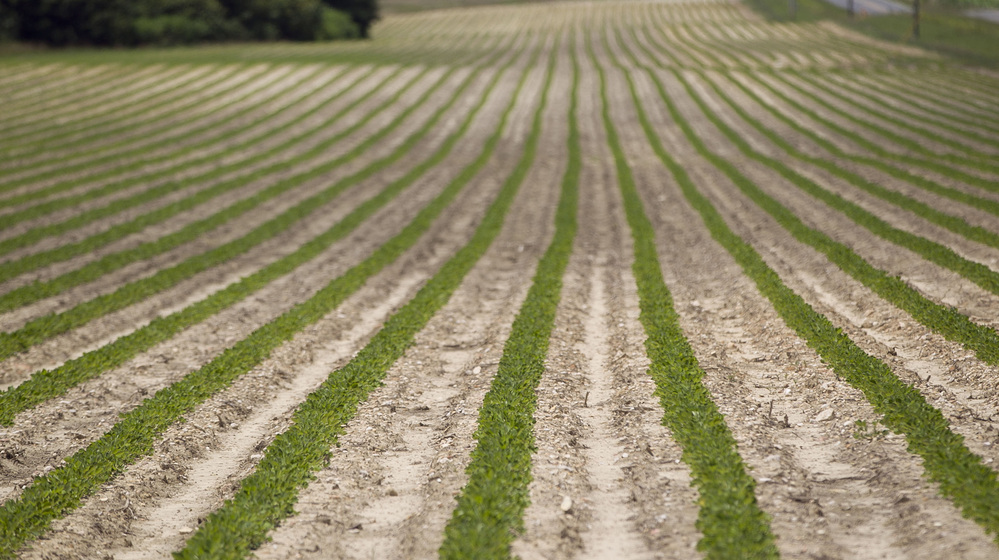 Enlarge image i
Enlarge image i Peanut plants grow on a Halifax, N.C., farm that received federal subsidies in 2011.

Peanut plants grow on a Halifax, N.C., farm that received federal subsidies in 2011.
It's amazing how many different kinds of people have been trying to abolish or at least change the government's payments to farmers. They include economists, environmentalists, taxpayer advocates, global anti-hunger advocates and even a lot of farmers. Some have been fighting farm subsidies for the past 20 years.
This past year, those critics laid siege to offices on Capitol Hill because the law that authorizes these programs the farm bill was about to expire. (It has to be renewed every five years.)
But instead of passing a new five-year renewal, Congress extended only parts of the previous bill by nine months.
And so the reformers lost, again.
On the other hand, the big farm organizations that wanted to lock in generous subsidies for another five years also failed. All in all, the result was more like a stalemate, and the battle over farm subsidies now will resume in the new Congress. Some of the anti-subsidy campaigners are calling it a victory.
What's this argument all about? The economic case against subsidies is pretty straightforward: Taking money from taxpayers to make life more secure for farmers is wasteful and inefficient. "There's seemingly an intent to remove as much risk from agricultural production as possible with subsidies and subsidized insurance. We typically don't see anything like that for other sectors of the economy, at least not to that degree," says Barry Goodwin, a professor of economics at North Carolina State University.
Environmentalists like Scott Faber from the Environmental Working Group blame crop subsidies for destroying wildlife habitat. "Subsidies encourage farmers to plow up wetlands and grasslands that they wouldn't plant if they were simply responding to the market," he says.
The anti-hunger advocates, like Oxfam, argue that aid to American farmers makes it harder for farmers in poor countries to compete in the global marketplace. And the local/organic/alternative farming crowd says those subsidies go to the wrong kind of agriculture big farms growing corn, soybeans, cotton and rice, which aren't really the cornerstones of a healthy diet. If there are subsidies, these groups say, they should go to small farms, organic farms, and farmers growing fruit and vegetables.
Over the years, these critics have had some successes. Farm payments went way up in the late 1990s, but they have been falling ever since.
Last year, the anti-subsidy alliance saw a big opportunity. The law was up for renewal at a time when farmers hardly needed help. Apart from dairy and meat producers who were hit hard by last summer's drought, farmers have been doing very well in recent years, better than most Americans.
So the negotiating and dealing started.
The reformers got Congress to kill one big subsidy program, called direct payments. This program passed out more than $4 billion a year to farmers based simply on records of past agricultural production from land that they own.
Farmers, for their part, argued that farming is still a really risky business and that farm programs help ensure a stable supply of food. They persuaded Congress to increase subsidies for another kind of safety net, crop insurance.
And then, in the frantic end-of-the-year rush to resolve the government's fiscal crisis, all of that went out the window.
House and Senate leaders simply extended the farm subsidies that have been in place for that past five years. Those programs will continue until September.
When Sen. Debbie Stabenow, D-Mich., chairwoman of the Senate Agriculture Committee, heard what had happened, she went to the Senate floor on New Year's Eve to vent her outrage. "Here's what happens under this extension: The subsidies that we agreed to end, continue! It's amazing how it happens. The folks that want the government subsidies find a way to try to keep them at all costs."
Some of those advocating for reform of farm subsidies agreed that the extension was a disaster. The National Sustainable Agriculture Coalition, which represents small organic farmers, was angry. The coalition thought that Congress was on the brink of funding a collection of small programs that funnel money to organic farming and local food production.
But Faber, from the Environmental Working Group, which has led the anti-subsidy fight for many years, saw it as a partial victory. Congress, he noted, had refused to approve generous new five-year deal for farmers. Instead, the battle will continue in the new Congress.
No comments:
Post a Comment